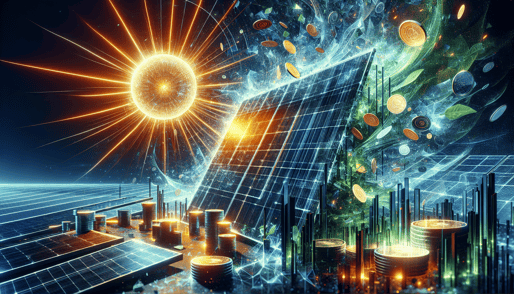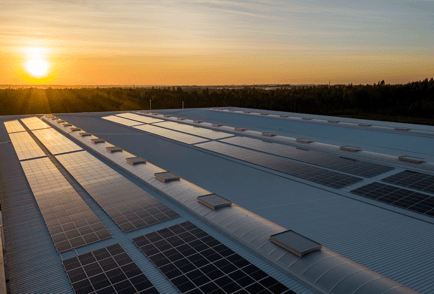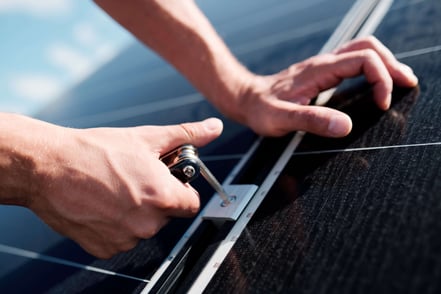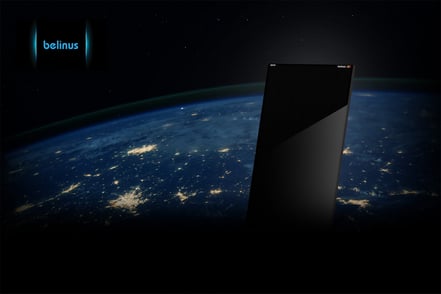Maximising solar energy yield is crucial for the efficient use of this renewable resource. Glass-glass solar panels offer a promising solution to achieving this goal. These panels consist of two layers of glass, providing increased durability, efficiency, and a longer lifespan compared to traditional glass-foil solar panels. We, at Belinus, offer high-quality glass-glass solar panels, incorporating cutting-edge technology to deliver superior performance and maximise energy yield.

What are glass-glass solar panels?
Glass-glass solar panels are a type of solar panel that features a unique construction compared to traditional glass-foil panels. In a glass-glass solar panel, the solar cells are encapsulated between two layers of glass, providing enhanced protection and durability. This design offers several advantages that contribute to maximising solar energy yield.
Comparing glass-glass solar panels with traditional glass-foil panels, the latter have a glass layer on the front and a plastic foil layer on the back. While glass-foil panels are widely used, they are prone to issues such as moisture ingress and microcracking. On the other hand, glass-glass solar panels are less susceptible to these problems, contributing to their superior performance and longevity.
Belinus offers high-quality glass-glass solar panels that boast cutting-edge technology and exceptional durability. Some of the key features of our glass-glass solar panels include resistance to extreme weather conditions, a significantly reduced risk of developing microcracks, and up to 25% higher energy yield compared to traditional solar panels.
Advantages of glass-glass solar panels
Glass-glass solar panels offer several benefits compared to glass-foil solar panels, making them an ideal choice for those looking to maximize their solar energy yield. These advantages include:
1. Increased energy yield
One of the most significant benefits of glass-glass solar panels is their increased energy yield. By utilizing advanced technologies and materials, these panels can produce up to 25% more energy than traditional glass-foil panels, ensuring that you get the most out of your solar installation.
2. Higher durability and resistance to extreme weather conditions
Glass-glass solar panels are designed to withstand extreme weather conditions, such as hail, snow, and high winds. This enhanced durability ensures that your solar installation remains functional and efficient, even in the face of harsh environmental conditions.
3. Reduced risk of microcracks and improved performance
Microcracks can significantly impact the performance of solar panels, leading to reduced energy output and a shorter lifespan. Glass-glass solar panels are less prone to developing microcracks, ensuring that your installation maintains its peak performance for a longer period.
4. Enhanced fire safety
Fire safety is a crucial consideration for any solar installation. Glass-glass solar panels are certified for fire safety, providing an additional layer of protection for your home or business and ensuring that your solar investment remains secure.
5. Longer lifespan and comprehensive warranty
With a longer lifespan compared to traditional glass-foil panels, glass-glass solar panels provide a more reliable and long-lasting solar solution. At Belinus, this extended lifespan is backed by a comprehensive 35-year warranty on the product, power output and service, offering peace of mind and a secure investment for the future.
Advanced technologies used in glass-glass solar panels
Several advanced technologies contribute to the superior performance of glass-glass solar panels, including Belinus' offerings. By incorporating Interdigitated Back Contact (IBC) technology, Heterojunction Technology (HJT), and ultra black solar cells, these panels achieve higher efficiency and better energy yield.
1. Interdigitated Back Contact (IBC) technology
IBC technology involves placing all the electrical contacts on the rear side of the solar cell. This eliminates shading caused by the front-side metal contacts, allowing the cell to capture more sunlight and produce more energy. Furthermore, IBC technology reduces the internal resistance of the cell, resulting in higher conversion efficiency.
2. Heterojunction Technology (HJT)
HJT combines the advantages of crystalline silicon (c-Si) and amorphous silicon (a-Si) in a single solar cell. This technology uses thin layers of a-Si on either side of the c-Si wafer to form a highly efficient junction for converting sunlight into electricity. HJT solar cells exhibit excellent temperature coefficients, leading to better performance in hot environments, and higher energy yield throughout the day.
3. Ultra black solar cells for increased light absorption
Ultra black solar cells are designed to absorb up to 99.7% of available sunlight. These cells feature an anti-reflective coating that minimises reflection losses and maximises light absorption, resulting in greater energy production. The improved light absorption of ultra-black solar cells contributes to the enhanced efficiency of glass-glass solar panels.
4. Role of these technologies in Belinus' glass-glass solar panels
We incorporate IBC, HJT, and ultra black solar cells in our glass-glass solar panels, enabling them to deliver higher efficiency and increased energy yield. By utilising these cutting-edge technologies, our panels not only maximise solar energy output but also provide long-lasting and reliable performance in a wide range of applications.
Applications of glass-glass solar panels
Glass-glass solar panels, with their enhanced efficiency and durability, can be employed in a variety of settings. Their versatility makes them a suitable choice for different types of installations, ranging from residential to utility-scale projects. In this section, we will explore the various applications of glass-glass solar panels, emphasising their adaptability in different scenarios.
A. Residential installations
Homeowners can benefit from installing glass-glass solar panels, as they provide a higher energy yield and require less maintenance compared to traditional glass-foil panels. With a longer lifespan and comprehensive warranty, these panels offer an attractive solution for generating clean, renewable energy at home while reducing long-term costs.
B. Commercial installations
Businesses and commercial establishments can also take advantage of glass-glass solar panels, which can be installed on rooftops, parking lots, or even as solar canopies. These installations not only help companies meet their sustainability goals but also provide a reliable source of energy, reducing dependency on the grid and cutting down on energy expenses.
C. Utility-scale solar projects
Utility-scale solar projects, such as solar farms or large-scale installations, can greatly benefit from the use of glass-glass solar panels. Their increased efficiency and durability allow for maximum energy production, which contributes to a higher return on investment for project developers. The panels' resistance to extreme weather conditions and lower risk of microcracks also ensure sustained performance over time.
D. Specialised installations
Finally, glass-glass solar panels can be utilised in specialised installations, such as bifacial solar panels. These panels capture sunlight on both sides, further increasing the energy yield. By combining the advantages of glass-glass panels with the unique features of bifacial technology, these installations can achieve even greater efficiency, making them an excellent choice for maximising solar energy yield.
Cost comparison: glass-glass vs glass-foil solar panels
When considering the switch to glass-glass solar panels, it is essential to compare the costs with traditional glass-foil solar panels. This section covers three key aspects of cost comparison: initial investment costs, maintenance and replacement costs, and long-term return on investment and energy yield.
Initial investment costs
Glass-glass solar panels typically have a higher initial investment cost compared to glass-foil panels. This is due to their advanced technology, increased durability, and enhanced performance features. However, it is important to consider that the higher upfront cost is often offset by the long-term benefits that glass-glass solar panels provide, such as increased energy yield and a longer lifespan.
Maintenance and replacement costs
One of the key advantages of glass-glass solar panels is their reduced maintenance and replacement costs. Their superior durability and resistance to extreme weather conditions and microcracks mean that they are less likely to require repairs or replacements over their lifespan. This can result in significant cost savings in the long run compared to glass-foil panels, which may be more susceptible to damage and require more frequent maintenance.
Long-term return on investment and energy yield
When evaluating the cost-effectiveness of glass-glass solar panels, it is crucial to consider their long-term return on investment and energy yield. Glass-glass solar panels offer up to 25% higher energy yield compared to traditional glass-foil panels, maximizing the energy produced from solar installations. This increased energy yield, combined with their longer lifespan and reduced maintenance costs, often results in a higher return on investment over the lifetime of the solar installation. Therefore, while the initial investment may be higher for glass-glass solar panels, their long-term benefits can make them a more cost-effective choice for maximizing solar energy yield.
Sustainability and quality standards of Belinus solar panels
Belinus is committed to producing solar panels with the highest standards of sustainability and quality. This commitment is evident in several aspects of our operations, starting with our choice to work with Bloomberg Tier-1 listed factories. These top-tier factories adhere to strict manufacturing processes and quality controls, ensuring that our glass-glass solar panels are of the highest standard.
Another critical aspect of our sustainability and quality standards is our global presence and customer assurance. With headquarters in Genk, Belgium, and a presence in over 10 countries across Europe, Belinus is a key player in the solar energy market. This broad reach ensures that our solar panels are available to a wide range of customers, allowing more people to benefit from the advantages of glass-glass solar panels. Furthermore, we offer a comprehensive 35-year all-in-one warranty, providing customers with peace of mind and guaranteed performance.
Conclusion
In conclusion, glass-glass solar panels offer significant benefits for maximizing solar energy yield. These panels feature increased energy yield, higher durability, resistance to extreme weather conditions, and a reduced risk of microcracks. Furthermore, the use of advanced technologies such as IBC, HJT, and ultra black solar cells enhances the efficiency and performance of these panels.
Belinus is committed to delivering high-quality products and technologies that contribute to sustainable energy solutions. If you are interested in learning more about Belinus's products and technologies, or if you wish to discover how to purchase their solar panels, we encourage you to explore our website and offerings. By investing in glass-glass solar panels, you are making a wise decision to maximize the solar energy yield for your home or business and contributing to a more sustainable future.




